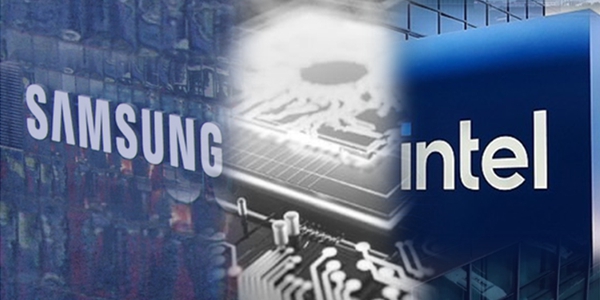[Business Post] Samsung Electronics Chairman Lee Jae -yong is visiting the United States as part of the economic delegation for the South Korea-U.S. summit, and there are speculations that he is actively exploring a strategic alliance with Intel to strengthen
Samsung Electronics' foundry (semiconductor contract manufacturing) business. Samsung Electronics is reportedly considering investing in packaging, a post-processing area of the foundry industry where Intel holds a relative advantage, and utilizing Intel's packaging production lines in the United States. Samsung is also reportedly exploring leveraging Intel's semiconductor glass substrate technology.
Samsung Electronics, which has been considering additional investments in the United States following its $37 billion (approximately 51 trillion won) investment in a foundry plant in Taylor, Texas, is believed to be partnering with Intel to invest in packaging production lines.
According to a comprehensive semiconductor industry report on the 26th, Samsung Electronics is expected to strengthen its post-processing cooperation with Intel in packaging, further tightening its grip on Taiwan's TSMC, which dominates the global foundry market.
A semiconductor industry insider said, “We understand that Samsung Electronics is considering a possible strategic partnership with Intel, and it is likely that this will involve collaboration in the packaging sector. Intel has strengths in packaging and is also ahead in glass substrate technology.”
The foundry process is divided into the front-end process, which involves engraving circuits on wafers to create chips, and the back-end process, which involves packaging and testing the chips. Samsung Electronics Foundry is considered to be ahead of Intel in front-end technology, but Intel holds a competitive edge in back-end technology.
Samsung Electronics Foundry primarily produces front-end wafers and then sends them to back-end packaging specialists (OSAT) for testing and packaging. TSMC also collaborates with Taiwanese OSAT companies, but it possesses the most advanced packaging back-end technology.
TSMC's flagship packaging technology is "Chip-on-Wafer-on-Substrate (CoWoS)" technology, which became famous for its use in NVIDIA's AI semiconductor production.
Intel, along with TSMC, is considered to have a competitive edge in back-end packaging.
A source familiar with Intel said, “The core of the cooperation between Samsung Electronics and Intel will be packaging,” adding, “Intel Foundry is applying hybrid bonding packaging technology to its 18A (2nm-class) process production, and although it is behind in front-end node technology, it has a clear advantage in packaging.”
Hybrid bonding is a packaging technology that stacks chips using copper without ‘bumps’ between chips. Although it is not yet used in memory semiconductors such as high-bandwidth memory (HBM), Intel and TSMC are already using this technology for packaging CPUs and image sensors (CIS).
In general, Samsung Electronics ranks second after TSMC in market share calculated only for the front-end process of foundries. However, when market share is calculated including both the front-end and back-end processes of foundries, Intel is ahead of Samsung Electronics.
According to a survey of integrated foundry pre- and post-process market share by revenue for the first quarter of 2025 conducted by market research firm Counterpoint Research, TSMC ranked first with a 35.3% market share, followed by Intel with a 6.5% share. Samsung Electronics ranked fourth with a 5.9% market share, following Taiwanese post-processing company ASE.
There are also speculations that the collaboration between Samsung Electronics and Intel could continue in the next-generation semiconductor ‘glass substrate’.
Glass substrates are attracting attention as promising candidates for high-performance AI semiconductors due to their smoother surfaces, lower coefficient of thermal expansion, higher thermal stability, thinner thickness, and improved electrical performance compared to conventional plastic substrates.
An industry insider stated, "Intel is currently licensing its Glass Core Substrate (GCS) technology to create a revenue-generating structure. Intel, which has developed glass substrates for over a decade, has now opened up its technology, making collaboration with Samsung Electronics even smoother."
Samsung Electro-Mechanics has also hired Kang Du-an, a senior engineer with extensive experience researching glass substrates at Intel, as Vice President of Technology Marketing and Application Engineering. Vice President Kang will be responsible for analyzing semiconductor packaging market technologies related to glass substrates and R&D strategies. Some
speculate that Samsung Electronics and Intel's foundry collaboration could serve as a model for US-Korea semiconductor cooperation aimed at catching up with Taiwan's TSMC, which accounts for over 70% of the global market.
The collaboration between Samsung Electronics and Intel could take the form of equity investments or joint ventures (JVs) where they jointly invest capital, technology, and human resources for specific business purposes.
Singapore-based investment media outlet SmartKarma reported, "From a political perspective, Samsung Electronics' collaboration with Intel aligns perfectly with Trump's 'Save Intel' policy." The report added, "Samsung and Tesla's 2nm AI6 order was also a groundbreaking development, and closer collaboration with Intel will further accelerate that momentum." By Kim Ho-hyun

ì¼ì±ì ì-ì¸í íì´ë리 ë맹 íì§, TSMC ì¶ê²© ìí´ í¨í¤ì§ë¶í° ì 리기íê¹ì§ ìì¡ë
ì¼ì±ì ì-ì¸í íì´ë리 ë맹 íì§, TSMC ì¶ê²© ìí´ í¨í¤ì§ë¶í° ì 리기íê¹ì§ ìì¡ë
